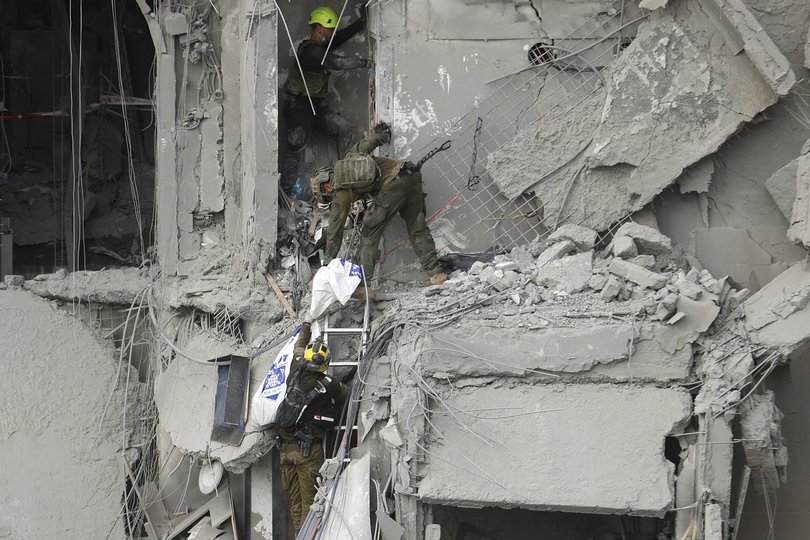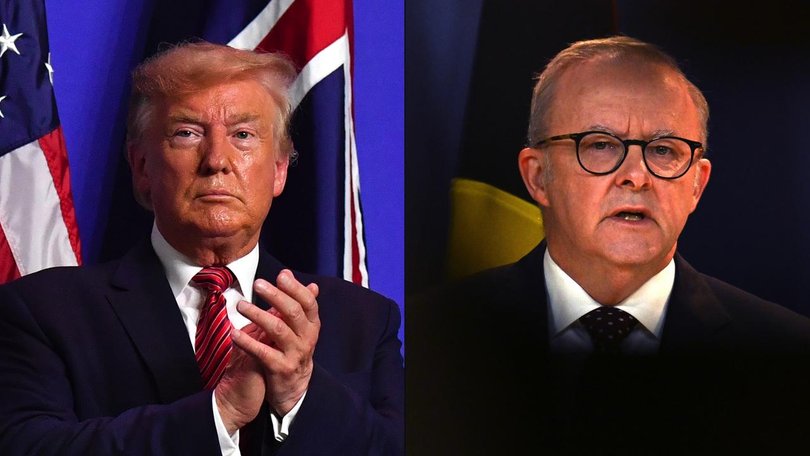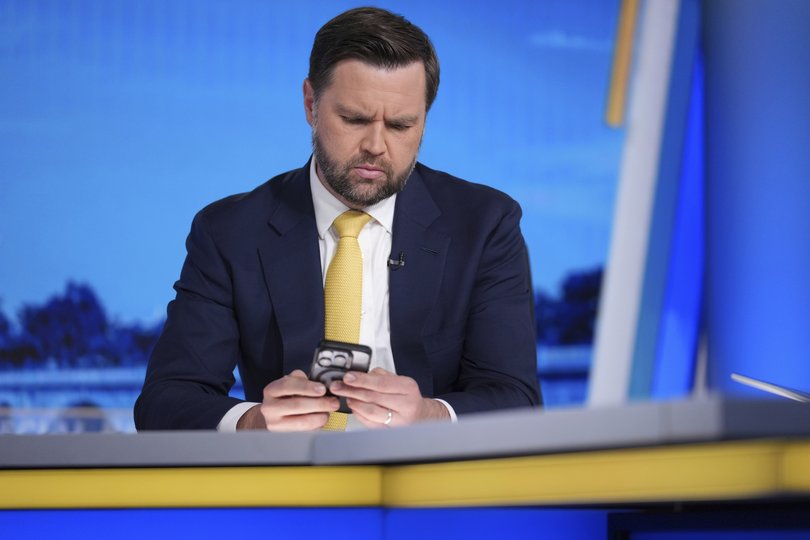Trump’s ceasefire in tatters as Iran resumes missile barrage on Israel
Israel’s Defence Minister, Israel Katz, said Iran had ‘completely violated’ the ceasefire, brokered by US President Donald Trump on Tuesday morning, AEST, and Israel in response would ‘respond forcefully’.
A fragile ceasefire between Israel and Iran appears to have lasted fewer than three hours.
Sirens sounded out in northern Israel about 5.30pm AEST, after the country’s defence force detected an “incoming barrage” of missiles launched from Iran.
Israel’s Defence Minister, Israel Katz, said Iran had “completely violated” the ceasefire, brokered by US President Donald Trump on Tuesday morning, AEST, and Israel in response would “respond forcefully”.
Sign up to The Nightly's newsletters.
Get the first look at the digital newspaper, curated daily stories and breaking headlines delivered to your inbox.
By continuing you agree to our Terms and Privacy Policy.The breakdown in the precarious agreement came just hours after Mr Trump told the two countries “please do not violate it”.
However, Iran’s military has denied that it fired missiles at Israel after the ceasefire began, Iranian state television reported.
The report cited the general staff of Iran’s armed forces, which includes its regular military and its paramilitary Revolutionary Guard.
Israel reported missile fire some two and a half hours after the ceasefire began. Israeli officials have ordered a strike on Iran in response, though there’s no immediate report of an attack there.
A precarious ceasefire that could end the 12-day Israel-Iran war came into effect on Tuesday afternoon as architect US President Donald Trump told the two countries “please do not violate it”.
Earlier, Israel said its military aims had been achieved but has vowed to “respond forcefully” if Iran violates the ceasefire, which was announced by Mr Trump on Tuesday morning, AEST - hours after Iran had fired at the United States military base in Qatar.
Laying out a multi-step timeline, Mr Trump said Iran was to stop attacking Israel at 2pm Tuesday, AEST, with Israel to stop their attacks shortly after. If that total ceasefire holds until 2pm Wednesday, AEST, President Trump said that would “bring an official end to the 12 day war”.
“On the assumption that everything works as it should, which it will, I would like to congratulate both countries, Israel and Iran, on having the stamina, courage, and intelligence to end… the 12 day war,” Mr Trump said on Tuesday morning, AEST.
“This is a war that could have gone on for years, and destroyed the entire Middle East, but it didn’t, and never will.”

After firing six rounds of missiles at Tel Aviv and Beersheba, where a residential building was directly hit and at least four people were killed, Iranian state media confirmed Tehran had entered the ceasefire shortly after 2pm AEST.
Mr Trump declared just after 3pm AEST the “ceasefire is now in effect”, with Israeli Prime Minister Benjamin Netanyahu confirming an hour later that Israel would comply.
Less than three hours after the ceasefire came into effect, sirens sounded in northern Israel after the defence force detected an “incoming barrage” of missiles launched from Iran.
In a statement, Mr Netanyahu’s office confirmed Israel’s security cabinet had met on Monday night, local time, and backed Mr Trump’s proposal for a truce.
He claimed Operation Rising Lion had been a “tremendous success”, during which Israel had achieved its objectives.
“Israel has removed a dual immediate existential threat – both in the nuclear and ballistic missile fields,” his office said.
“Additionally, the IDF has achieved full aerial control over Tehran’s skies, dealt a severe blow to the Iranian military leadership, and destroyed dozens of key regime targets in Iran.”
He vowed Israel would “respond forcefully” to any violation and thanked Mr Trump for US support “in eliminating the Iranian nuclear threat”, after American bombs damaged three Iranian nuclear facilities on the weekend.
Mr Trump had earlier said he believed the ceasefire “is unlimited”.
“It’s going to go forever,” he told NBC News on Monday night, Washington time, adding he didn’t believe Israel and Iran would “be shooting at each other again”.
Earlier, Prime Minister Anthony Albanese had welcomed the nascent deal, saying he wanted it to be fully implemented.
“We do want to see dialogue and diplomacy replace any escalation,” he told Sky News.
He said he hoped a ceasefire would take pressure off officials who had been scrambling to try and help the 3000 Australians in Iran and 1000 in Israel as the crisis escalated.
“What we hope is that a more secure position, a ceasefire, will ensure that people don’t feel the need to get to safety,” he said.
There had been a scheduled flight out of Israel to evacuate Australians, but that could not take off.
Commercial travel had been disrupted on Monday and Tuesday as Qatar braced for Iran’s strikes.
Israeli air space reopened on Tuesday afternoon, AEST, for emergency flights.
Mr Albanese also rejected suggestions Labor had been flat-footed in its response to the US strikes on Iranian nuclear sites.
Mr Albanese and Foreign Minister Penny Wong spoke to the media on Monday morning, a full day after Mr Trump had ordered the strikes on the Fordow, Natanz and Isfahan facilities.

In the immediate aftermath, a statement from an unnamed government spokesperson did not support nor condemn the US’ actions, prompting criticism.
Mr Albanese dismissed those critiques on Tuesday, saying he ran a “considered, orderly government”.
“We were very clear for some period of time that Iran could not be allowed to have a nuclear weapon. We called for Iran to come to the table to ensure that the United States wouldn’t have to take the action that they did.”
President Trump took credit for the ceasefire deal, saying Israel and Iran had come to him “almost simultaneously” asking for peace, contradicting reports that Qatar had been the one to get Tehran to agree.
Iranian state media had reported President Trump had requested the ceasefire “in a begging-like manner” shortly after Iran struck the US’ Al Udeid base.
“Last evening, only an hour after the successful missile attack by the Sepah on America’s Al Udeid Base in Qatar, in a begging-like manner of urging, Trump requested the initiation of a ceasefire in the imposed Zionist enemy war against our country,” an anchor with state-run Iran National News Network said in a live broadcast.

But a senior White House official told Reuters the deal had been brokered with Mr Trump talking to Mr Netanyahu while senior US officials, including Vice President JD Vance, held talks with Tehran.
News of the ceasefire agreement came just hours after Qatari air defence thwarted Iran’s attack at the Al Udeid Air base in Qatar. Iran provided advance warning of the attack and there were no casualties.
Australia had joined other countries in condemning the attack, with Senator Wong saying “we do not want to see further escalation”.
“A full-scale war in the Middle East would be devastating for all the people of the region and the world,” she wrote on Tuesday morning.
Opposition Leader Sussan Ley also condemned the attack
“This provocative act was a violation of Qatari sovereignty,” she said.
“Australia must always stand firmly with our allies and partners, including the United States, in the face of such aggression. We also reaffirm our support for the actions taken by the United States to prevent the Iranian regime from acquiring nuclear weapons.”
Tehran’s strikes were in retaliation to the US’ attack on three Iranian nuclear facilities on Saturday, local time, which Mr Trump claimed “completely obliterated” the sites.
In the aftermath of that US strike, the President left the door open to regime change, but the ceasefire now in effect makes no mention of regime change.
Mr Trump and other NATO leaders are set to meet in The Netherlands on Tuesday and Wednesday, local time, for the annual summit where the fragile ceasefire is set to be discussed.
German Chancellor Friedrich Merz said he wanted leaders to discuss “how the situation can now be further stabilised”.

